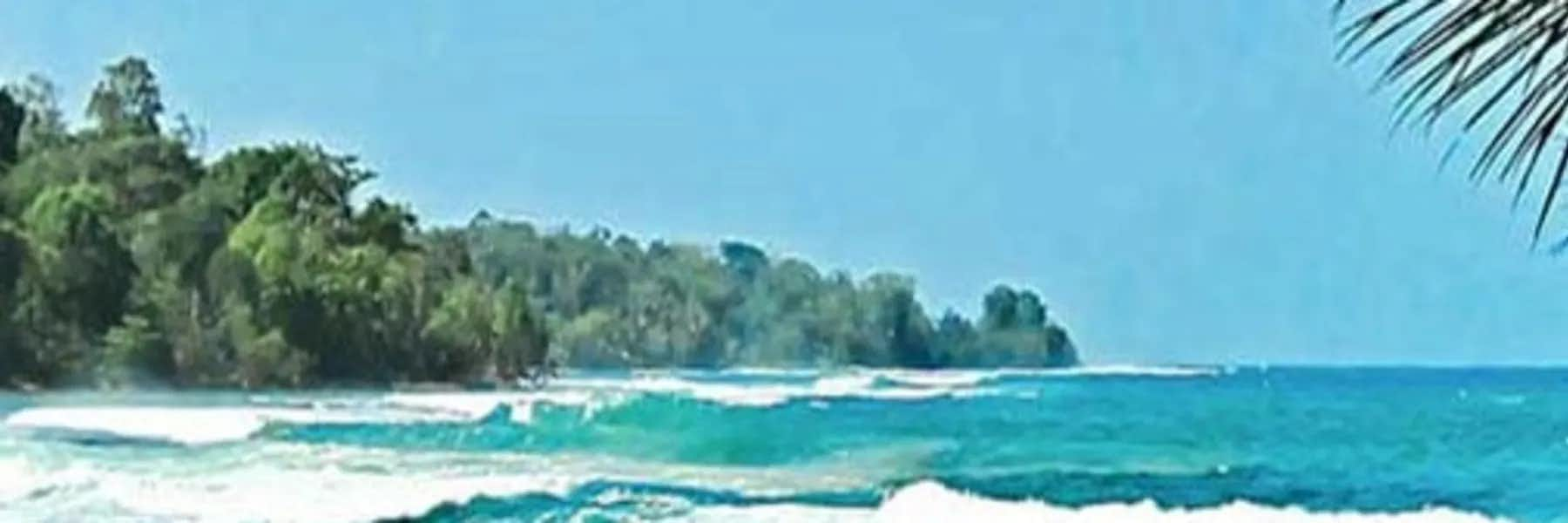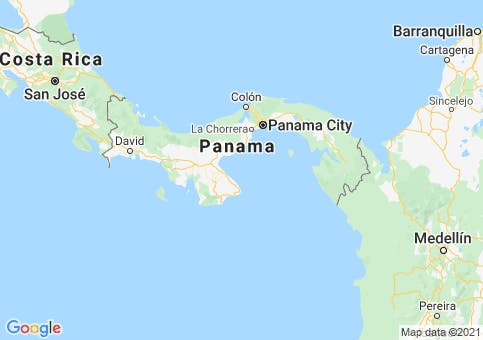Bocas del Toro may well be the best-kept secret in the Caribbean, and that makes it a rare off-the-radar gem indeed. Part-mainland and part-archipelago, Bocas is one of Panama’s two westernmost provinces, right on the busy border with neighboring Costa Rica.
Take a one-hour flight from Panama’s capital city to Bocas Town on the archipelago’s main island, Isla Colón, and suddenly you’re in a different world. Hundreds of islands and smaller islets—bursting with lush rainforest growth—surround you. Many are completely uninhabited, making visitors feel like they’ve stepped back into prehistoric times. Others form part of the autonomous reserve lands of the Ngäbe-Buglé, one of Panama’s largest Indigenous tribes.
The myriad beaches of Bocas are quintessential Caribbean…turquoise waters and white sands, coconuts growing from a fringe of bright-green palms. Outside of reserve areas, locals are primarily of African descent. Some of their ancestors hailed from other parts of the Caribbean like Jamaica and Barbados, while others are descended from African slaves brought here by colonizers.
The Caribbean gets double the rainfall of the Pacific coast—around 120 inches a year versus 60 to 70. Still Bocas continues to be popular...and with good reason. Days tend to start out sunny, with rain clouds moving in after 2 p.m. And it’s completely outside the hurricane belt (all of Panama is). Visitors run the gamut, from backpackers, surfers, and bohemian types to the uber-wealthy that get choppered to resorts on outlying islands.
This region’s thriving expat community—mostly centered around Isla Colon—includes retirees, twenty-somethings, and everything in-between. Many an expat has started a business here, and success stories include a popular Indian restaurant called Om Café and Super Gourmet, an upscale deli and wine and sundries shop.
Getting to Bocas Del Toro
Though many visitors choose to fly, the road from Panama City to Bocas crosses the Continental Divide, and the scenery is spectacular. The drive to the mainland town of Almirante is around 360 miles and takes seven to eight hours. Once in Almirante it’s another half-hour via ferry or water taxi to Bocas Town.
Bocas Town may not impress you. The airport and docks can seem shabby to outsiders. And if it’s raining—a frequent occurrence in these parts—you won’t get the full impact of the ocean’s pale blues and glassy greens. Don’t be discouraged…carry on to the main strip and you’ll see a bustling Caribbean town, with an excellent variety of inns, restaurants, and nightspots. New recycling bins, a plastic bag ban, solar panels, and water catchment systems are helping to keep this region clean and pristine. Though Isla Colón still has that small-island feel, a steady stream of tourists and a fun, welcoming international community help keep life here interesting.
Lifestyle in Bocas Del Toro
Expats living here tend to be drawn to water activities like snorkeling and paddle boarding, and are very involved in island life. Many of them volunteer for local organizations or start charitable initiatives of their own. Much good has come of this growth, with the community working to protect the flora and fauna, finding innovative uses for recyclable plastic, and more.
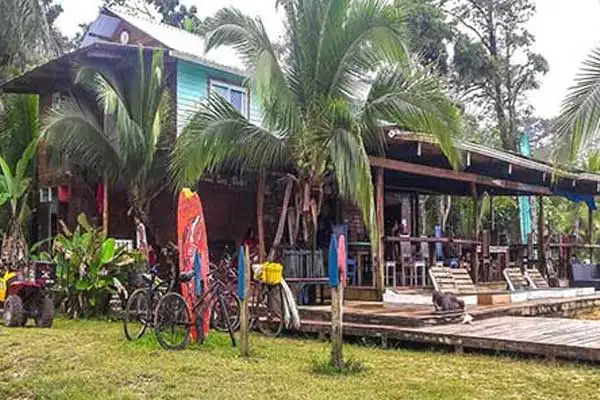
David and Alli Emerson moved to Isla Colón in 2015, after being wowed by some travel footage they caught on television. Today, they’re the owners of a small B&B called Surf Break @ Paunch. Located on the “quiet side” of the island, they’re about a 10-minute bike ride from the hubbub of the town center. They live onsite, so they never have a commute to work.
“It’s so pleasant to be out here, in our own house. The dogs can run around and we can sit out at night and look at stars,” says Alli. Though these days there are dozens of cars on Isla Colon, traffic past Paunch is very light. “It’s great to see people riding bikes to the beach,” says David. “That’s what this town was built for.”
“My favorite time of year is September to October, when the waters around our beach get really calm,” says Alli. The beach is never crowded—there’s no loud music or annoying hawkers. “Think of your favorite beach in the U.S. and imagine taking away the crowds, so you can have it all to yourself. That’s what it’s like here.”
Bocas Town has a public hospital offering inexpensive care. Services are basic—the hospital is equipped for x-rays, lab work, and minor dental work. For anything major, residents travel by boat or air to Panama City or David (a major city about four hours away by bus and ferry).
Get Your Free Panama Report Today!
Get Your Free Panama Report Today!
Learn more about a healthier outdoor life in Panama in our daily postcard e-letter.
Simply enter your email address below and we'll send you a FREE REPORT -- Panama: Easy, First-World Living and the World’s Best Retiree Program.

By submitting your email address, you will receive a free subscription to IL Postcards, Overseas Dream Home, The Untourist Daily and special offers from International Living and our affiliates. You can unsubscribe at any time, and we encourage you to read more about our Privacy Policy.
Real Estate in Bocas Del Toro
Much of Panama’s Caribbean territory consists of nature preserves and Indigenous territory, making it impossible to buy or build property. Elsewhere in Panama, land tends to be duly titled and safe to buy, with foreigners enjoying basically the same rights as locals. A lot of the land you’ll see advertised for sale in Bocas, however, is untitled or Right of Possession (ROP). For this reason, it’s best to rent here rather than buy…at least until you’re familiar with the landscape and well aware of the risks.
With a much lower cost of living than better-known hotspots like the Bahamas, Bocas is currently a great place to rent. Recently enterprising expats and locals have added to the local offerings by building small, simple homes and apartments that rent for as little as $550 a month. A fully-furnished condo listed recently for $600 a month even included WiFi.
Of course, there are some grander apartments and homes on offer in Bocas, as well. A two-bedroom, two-bathroom apartment in a quiet area with shared access to a large garden and terrace with air conditioning recently became available for $1,100 a month, while an identical apartment without air conditioning is just $950 a month.
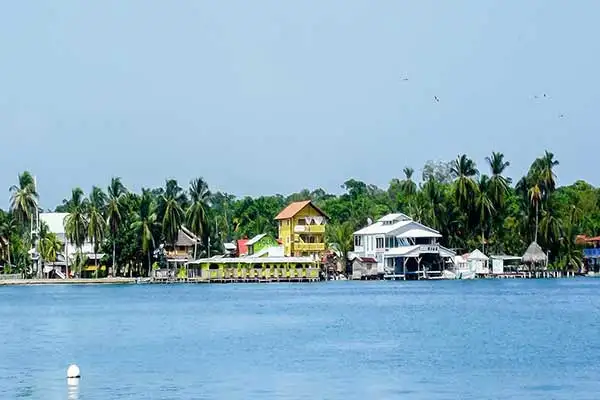
Depending on the lifestyle expats choose, a couple can live here on as little as $16,800 a year, or $1,400 a month, renting a simple, snug, island-style home.
You have choices in Bocas, whether you want to be in the busiest part of town, near the airport or water taxi marinas, or in the quieter areas that make up the bulk of the island. Tourists are visiting in increasing numbers and English is widely spoken. There are expats of all ages, both working and retired…and the opportunities to socialize and have fun are endless.
Cost of Living in Bocas Del Toro
Expats Renee Proctor and Fred Renner say: “We get beer and water delivered to our home. A case of beer is $13, delivered right to your door. Our water bill is just under $6 a month and we pay about $100 a month for electricity. We spend $400 to $500 a month on specialty meats plus groceries, though we can get a bag of fresh local veggies for $8.50.” A single person could spend as little as $80 a week on food—mostly local produce, with some organic or imported items in the mix.
At the small public hospital, you pay as little as $2 for a consult and $22 for an x-ray. Water taxis between islands cost as little as $3. If you’d like some help around the house, a maid will charge about $5 an hour to sweep, mop, change linens, do laundry, wash dishes … even help with prep and cooking if you want.
Monthly Budget Breakdown for a Couple in Bocas del Toro:
| Expense | U.S. $ |
|---|---|
| Rent (two-bedroom apartment) | $450 to $1,000 |
| Electricity (depending on air conditioning use) | $30 to $150 |
| Gas for cooking, hot-water heater, dryer, etc | $2 to $10 |
| Internet | $20 to $55 |
| Netflix, cable, or satellite television | $7 to $50 |
| Cell phone (mostly local use) | $10 to $50 |
| Groceries | $400 to $450 |
| Transportation | $50 to $165 |
| Water (often bundled with trash pickup) | $6 to $20 |
| Entertainment for two (dinner four times a month) | $120 to $250 |
| Monthly total: | $1095 to $2,200 |
Video Tour of Bocas del Toro
The Secret Haven of Bocas del Toro, Panama
By Johanne Sauve
When my husband, Doug, and I decided to spend seven weeks in Dolphin Bay, part of the Bocas del Toro archipelago, in the northwest corner of Panama, we were not sure what this adventure would bring…Other travelers had told us that it rained a lot and that we would find grocery shopping very sparse.
We were delighted to realize that these stories were mostly inaccurate. We were pleasantly surprised. The sun has been shining for us almost every day and we eat plenty of delicious food. Fresh tropical fruits every day, yogurt and granola in the morning, fresh green salads, local fish and seafood, and much more. We are feasting on many different kinds of bananas and making our own juice from abundant lemons and oranges from the land. To keep healthy, we sip fresh coconut water.
Food shopping is easy enough and the choices are plentiful. The prices are comparable to the rest of Panama. For about $100 a week, you will get a lot of variety. The small markets in town have all the basics; the two fish markets have plenty of seafood and the deli has lots of European treats and “gringo” type foods. What else could you wish for? Maybe a Costco for all your staples and big items? No problem! For a small fee, about 5% of your spending, a local lady will go shop for you in the larger town of David and bring all the weekly orders back to be picked up right here in Bocas town.
Throughout the Bocas archipelago we have discovered tiny floating restaurants and bars only accessible by boat. Navigation here can be a bit of a challenge because there are so many uninhabited mangrove islands and you are at the mercy of the weather. However, it's part of the fun of living off grid, where there are no roads to depend on.
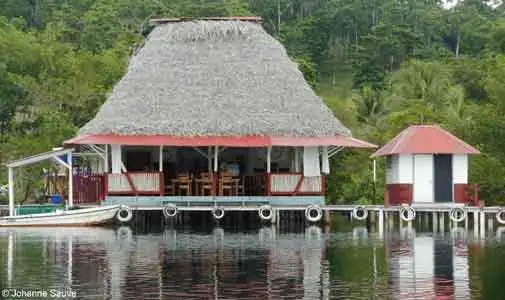
We have the pleasure of living on a beautiful organic cocoa farm in Dolphin Bay, surrounded by nature at its best. We have never experienced such a peaceful and quiet environment. Last night, we marveled at a most spectacular sky. An infinite number of stars shimmered across a moonless canvas.
The community of expats here in Dolphin Bay is a very interesting bunch. They are friendly, welcoming, but they also relish their privacy. They value the simple, quiet life without having to depend on city services. Solar panels provide the energy, rain catchment systems deliver the drinking water, and small boats are the transit system.
Many of these adventurers arrived by boat. They sailed here from all over the world, maybe on their way to somewhere else, and ended up dropping anchor in Bocas and calling it home. They have fascinating backgrounds and astonishing stories to share. They brought with them a special spirit that binds them together in their new home.
Every week, I join a small group of women playing dominos. Doug and I participate in local community projects, and we look forward to simply sharing Sunday morning brunch at a popular floating restaurant. There are abundant daytime activities but when the sun goes down, it’s time to head home and get tucked in for a long, restful night.
Like us, you can sojourn here if you are a bit of an adventurous soul and have good boating skills. My husband and I are having an experience to remember for a lifetime. This secret haven, known as Bocas del Toro, awaits your discovery.
Get Your Free Panama Report Today!
Get Your Free Panama Report Today!
Learn more about a healthier outdoor life in Panama in our daily postcard e-letter.
Simply enter your email address below and we'll send you a FREE REPORT -- Panama: Easy, First-World Living and the World’s Best Retiree Program.

By submitting your email address, you will receive a free subscription to IL Postcards, Overseas Dream Home, The Untourist Daily and special offers from International Living and our affiliates. You can unsubscribe at any time, and we encourage you to read more about our Privacy Policy.
